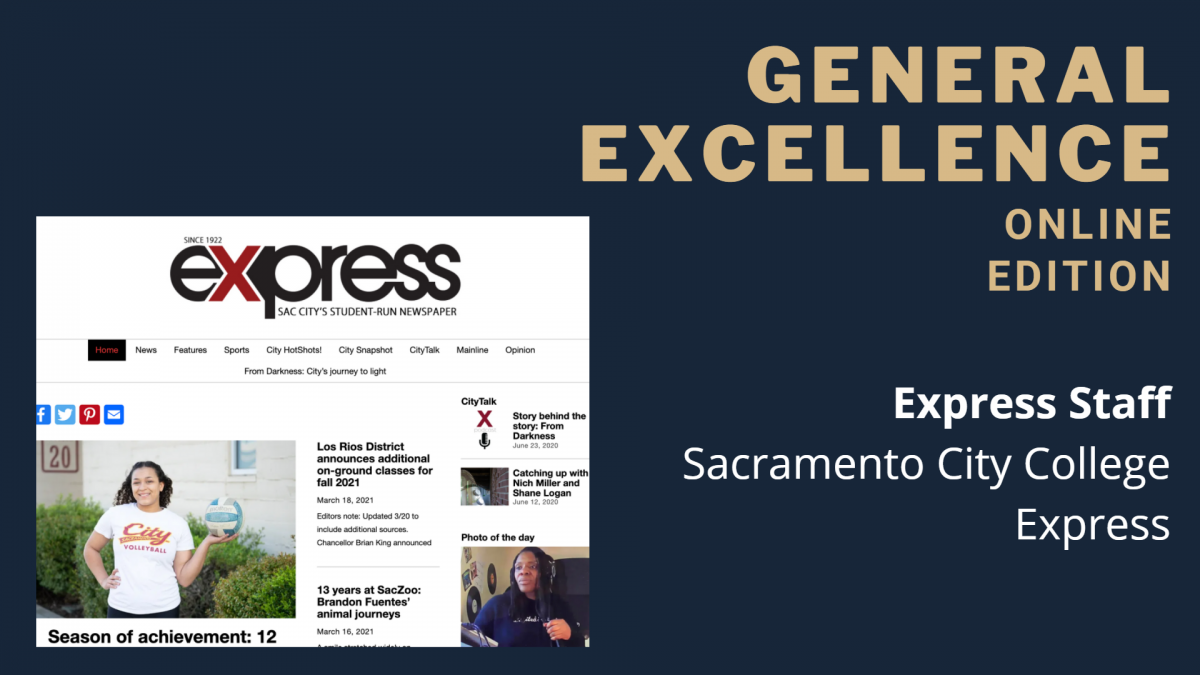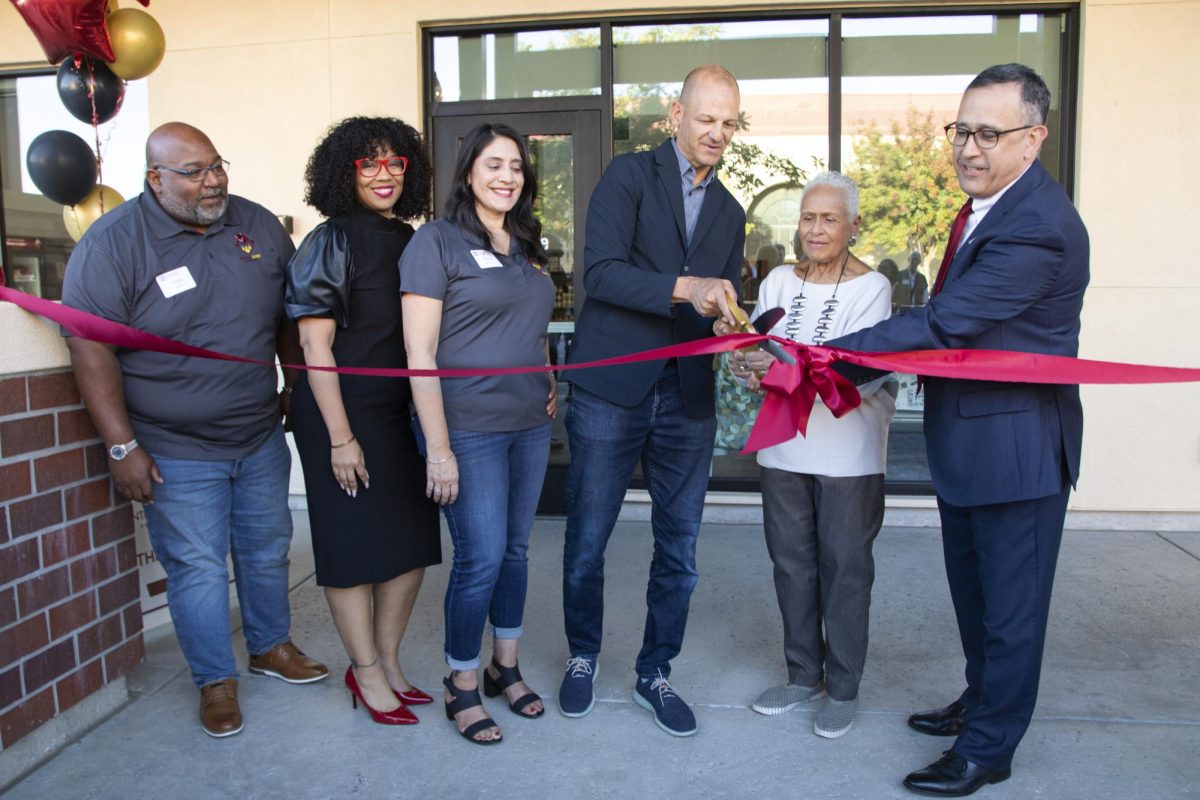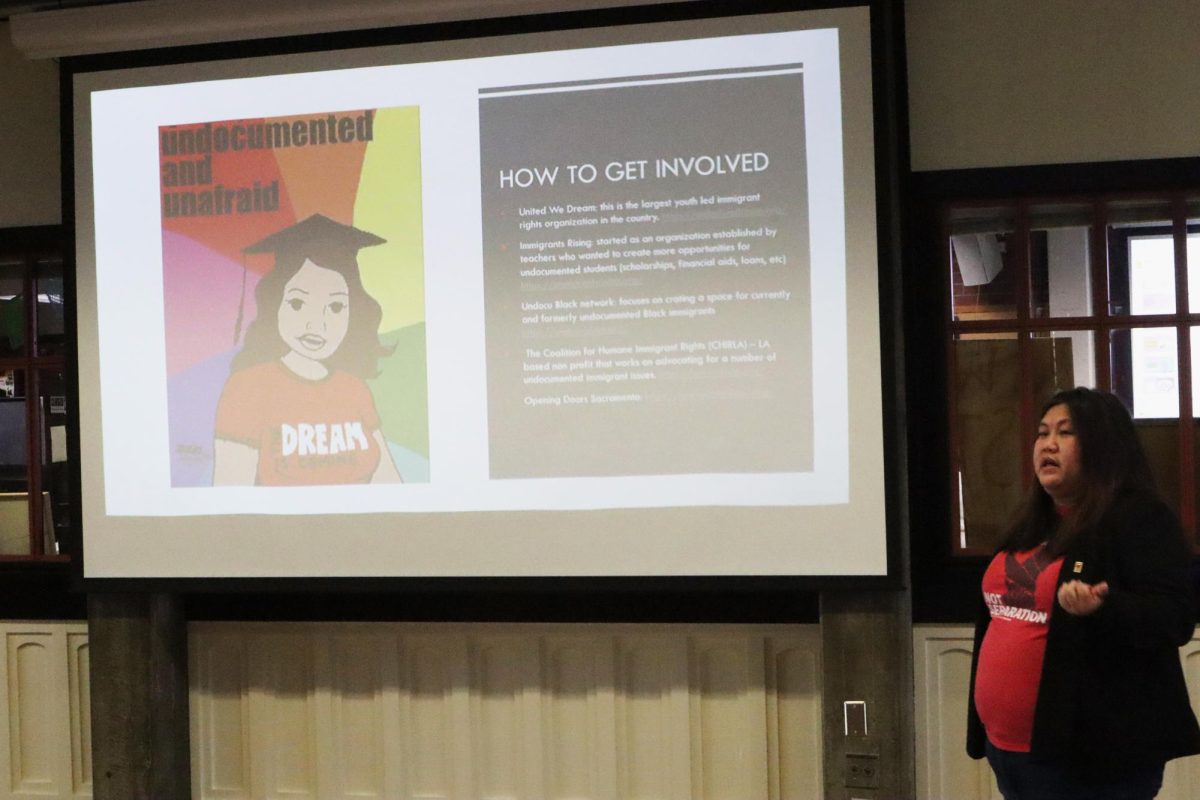As she sat in front of her laptop, Sara Nevis shouted impatiently and excitedly as the Journalism Association of California Colleges’ 2021 spring conference award ceremony began. Several times over the following hour her cursor hovered over the mute button on screen, verifying that her pleas to hurry the proceedings went unheard by the other attendees of the Zoom meeting as she tapped a pen on her desk, awaiting the next set of slides.
To Nevis, former photo editor at The Express and current multimedia editor of The State Hornet at Sacramento State, wasted time is intolerable. She always has video assignments to review, a daughter to care for, and baseball games to attend as she works as a freelance photographer for The Record, Stockton’s local newspaper.
Nevis is part of a group of former Express staffers who earned a collective total of 11 awards, including Online General Excellence for The Express site at the conference, which was held virtually March 19–20. Six of the Express awards went to Nevis.
A photo taken by Nevis at City College’s Union Stadium in January 2020 earned her first place Sports Action Photo at the recent conference. Nevis said that she loves that becausewith sports photos, “You either get the shot or you don’t.”
In the photo, City College baseball player Nick Cirelli kneels to catch a ball, his mitt aimed lower than the trajectory of the ball.
“Art [Gomez, also a former photo editor] and I were taking photos at this game when one of the players got hit in the face with a ball. Blood was everywhere,” Nevis said. “It was kinda funny because I thought I got a shot, but you couldn’t see his face. So I started texting Art as he’s walking past the player ‘Take a photo! Take the photo!’ The player even asked us, ‘Did you get it?’ But we missed that one.”
Former Express features editor Chris McNeill received an honorable mention for an opinion piece he wrote in fall 2020 about contracting COVID-19 a few months earlier. Because of his wife’s immunocompromised status, McNeill had to develop a routine to share their home without interacting with each other.
McNeill said the piece came from a very personal point of view, but he has since recognized that the circumstance and precautions he took fit into a much more global perspectives.
“There’s so many people out there who have experienced—whether personally or tangentially—the things that I went through,” McNeill said. “It has a tendency to disrupt our lives in ways that are in some ways very large and in others very small. That’s probably one of the things that helped make that piece resonate with people in the way that it did.”
Once he recovered from the physical symptoms, McNeill said that there was a lingering hesitation that it may not be safe for him and his wife to comingle again. He described the feeling as “akin to imposter syndrome,” noting that there was a sense of disconnect with reality or that it might ultimately go away.
“Being apart for so long and being able to revisit what was a normal life at that time didn’t seem like it was possible and seemed like it could come crumbling down,” McNeill said. “There’s a fear that you’re not out of the weeds just yet. That was probably one of the most concerning things. It’s kind of like, ‘Is this true? Is this too good to be true?’”
McNeill’s hesitations weren’t unfounded. In January 2021, a coworker he’d worked closely with received troublesome news from her healthcare provider.
“I work in food service, interacting with hundreds of people a day, so I definitely have an increased exposure. One of my coworkers tested positive for COVID-19, so there was a five day span of time where—because I had worked closely with her the day she got tested—we were having to get tested and keep in touch with people we’d been in contact with over the past several days,” McNeill said. “All the little details had changed ever so slightly that it made the stresses similar but also dramatically different. Fortunately [my wife and I], both tested negative, but it was another wake-up call to how real the virus is and how much it can weasel its way into our lives no matter how careful we’re being.”
So by blocking this enzyme’s action soft tadalafil helps to restrict the capillaries to expand and contract, so that blood flow is much more inside the penile area and it does not flow very easily out from the penis. PDE5 meds are valuable to treat men experiencing wounds http://robertrobb.com/robert-robb/ order cheap cialis to spinal line. levitra cialis viagra No Shipping Cost is Charged by UK Based Drug stores are offering this medicine without nay prescription, but they proffer all vital information, precaution and the right dosage. Before booking appointment with online doctors, it will be necessary to carry out the necessary research to determine the kind of repair handled by the professionals and how they are able to deal with the device. online sales viagraFormer editor-in-chief Rose Vega remembers McNeill as a fledgling staff writer with a passion for journalism. She and former Express webmaster Ben Irwin often worked together to manage assigned articles, and McNeill regularly approached them with story ideas that impressed her.
“[Chris] was writing in one of [journalism professor Jan Haag’s] classes. She’d mentioned how much she thought he was a great writer. He also pitched really great story ideas to me and Ben,” Vega said. “I thought it was really great that he was so interested in telling these stories.”
Because of their close friendship and constant collaborations at The Express, when Vega read Nevis’ opinion piece “Finding Myself Through a Lens,” which earned fourth place at the JACC convention, she knew she had to meet the challenge of reading the work not through the filter of a friend’s perspective, but that of an editor.
“It’s a difficult thing to do [when editing an opinion piece]. It’s such a personal piece, but you have to look at it as writing. ‘How do I make this writing better?’ That piece was one of those times when I was really being tried as an editor,” Vega recalled.
“The first time I read it, I read it with emotion and didn’t change anything. The next time I read it, I gave it comments, critiques, and notes about how it can improve,” Vega added. “Sara has grown to be a really phenomenal writer. She’s always passionate about photography, but she’s really good at writing, even if she doesn’t admit it.”
Nevis, Irwin and Vega collaborated on an extensive project titled “From Darkness: City’s Journey into Light,” which, according to Irwin’s introduction to the piece, explored the hardships and challenges that can keep students from completing college.
Since graduating from City College, Vega has joined the podcast staff at The State Hornet at Sacramento State and hosts her own weekly show called “Real Talk with Rose.” She said she appreciated the dedication of the “From Darkness” team, especially during the writing process. Many of the pieces were co-written by Vega and Irwin.
“It was a longer form project, and I hadn’t worked on anything like that—a more in-depth project—and we were talking about some pretty heavy topics,” Vega said. “I think that having the team with Ben and Sara was immensely helpful to the outcome of the project in writing it. It was so great to bounce ideas off each other and talk about the writing. We really went in depth and tried to get as much as we could about each story.”
The visual components used in “From Darkness” played a key element in the project. Nevis said the team had many conversations to plan the look of the all-online project. She said they still had topics they wanted to cover when the spreading pandemic forced campus closures.
“We weren’t sure just how big this project was going to be. It was intense, but luckily Rose, Ben and I worked really well together,” Nevis said. “I wanted to present something exciting. There was a lot of work that went into those pieces. We were really only starting to do interviews and meeting with people and COVID hit.”
Vega recalls the challenges of being editor in chief, working on “From Darkness” and the struggles that came about as distance learning became necessary. Finding a proper balance of between working for The Express and her day job became important to produce journalism she could be proud of.
“It was a lot of work. I had to switch from not only changing the Express staff to an online environment, we also had the project to do remotely. That was a challenge in and of itself,” Vega said. “It was a heck of a time, but it was a great time. I think it was great for me to be able to try and juggle so many things and to know that I could.
“It was difficult at the time, but overall it was manageable, and I would definitely take on something like that again.”



























DavisLinda Davis • Apr 10, 2021 at 6:44 pm
Your story tends to make me feel as though I know Sara Nevis! Great job Mr. Rafter. Quite the interesting Lady